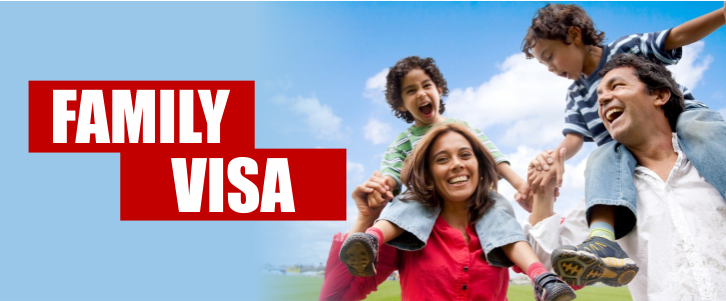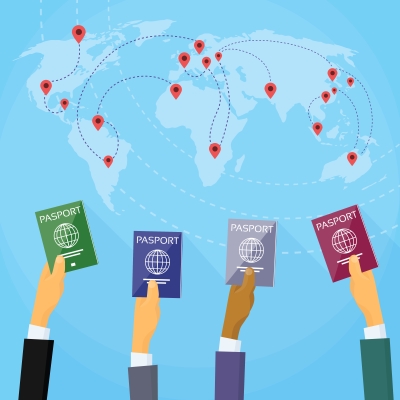Family Visa

Family Visa: Comprehensive Guide
Family visa is essential for bringing families together across borders. Whether it's reuniting with a spouse, a parent, or a child, this visa makes it possible for families to live together in the same country. This article will explain the different types of family visa, their eligibility criteria, and the application process.
Family visa is a special permit that allows family members of residents or citizens of a country to join them and live together. These visas recognize the fundamental importance of keeping families united, regardless of national borders.
Family visa plays a crucial role in maintaining the emotional and social well-being of families. Imagine a child separated from their parent for years due to visa issues. The emotional toll can be significant. Family visa helps avoid such heart-wrenching scenarios by providing a legal means for families to be together.

Top Family Visa Destination
- France Visa
- Germany Visa
- Spain Visa
- Finland Visa
- Italy Visa
- Greece Visa
Overview of Family Visa Types
Family visa comes in various types, each catering to different family relationships. Understanding these types is essential for anyone seeking to bring a family member to their country.
Spouse Visa
Spouse visa allows individuals to bring their husband or wife to live with them. For example, consider Maria, who moved to the United States for work and later applied for a spouse visa to bring her husband, John. Their reunion was a joyous moment made possible by the spouse visa.
Parent Visa
Parent visa enables residents to bring their parents to live with them. This visa is especially important for aging parents who need care and support from their children. For instance, Jane, living in Canada, brought her elderly mother to live with her, ensuring she received the care she needed.
Child Visa
Child visa allows parents to bring their children to join them. This type of visa ensures that families with young children can stay together, providing a stable and nurturing environment for the child's development.
Other Family Visa
Other family visa covers siblings and extended family members. This visa is less common but equally important for maintaining extended family connections. For example, siblings separated by borders can reunite and support each other through sibling visa.
Eligibility Criteria for Family Visa
Eligibility criteria for family visa vary, but some general requirements must be met by all applicants. Understanding these criteria can significantly increase the chances of a successful application.
General Requirements For Family Visa
Applicants must meet basic requirements, including being in a genuine relationship and having a legal right to apply for the visa. For instance, a spouse visa applicant must prove that their marriage is legally recognized and genuine.
Financial Requirements For Family Visa
Financial stability is a key criterion for family visa. Governments want to ensure that new residents will not become a financial burden on the state.
Income Thresholds
Applicants must meet specific income thresholds to qualify for a visa. For example, in the UK, a sponsor must have an annual income of at least £29,000 to bring a spouse.
Proof of Financial Stability
Applicants must provide evidence of their financial stability. This could include bank statements, employment letters, or business ownership documents.
Relationship Requirements For Family Visa
Proving the relationship between the applicant and the family member is crucial for visa approval.
Proof of Relationship
Applicants must provide documents proving their relationship, such as marriage certificates, birth certificates, or adoption papers.
Duration of Relationship
In some cases, the duration of the relationship matters. For instance, couples applying for a spouse visa may need to show they have been married for a certain period.
Health and Character Standards
Applicants must meet health and character standards to ensure they do not pose a risk to the country's public health or safety. This often includes medical examinations and police clearance certificates.
Applying for a Family Visa
Applying for a family visa involves several steps and careful preparation to ensure success.
Documentation Needed
Gathering the right documents is crucial for a smooth application process.
Personal Identification Documents
Applicants need to provide personal identification documents, such as passports, birth certificates, and national IDs.
Proof of Relationship Documents
Documents proving the relationship, like marriage certificates, birth certificates, and photographs, are essential for the application.
Application Process Of Famliy Visa
The application process can vary by country but generally involves similar steps.
Where and How to Apply
Applications are typically submitted online or at designated visa application centers. It's important to follow the specific instructions provided by the country's immigration authority.
Application Fees and Processing Times
Application fees and processing times vary. For example, the US charges $535 for a spouse visa application, and the process can take several months.
Common Pitfalls in Applications
Applicants often face common pitfalls, such as incomplete forms, missing documents, or incorrect information. Avoiding these mistakes can improve the chances of a successful application.
Benefits of Family Visa
Family visa provides numerous benefits that go beyond simply allowing family members to live together. These advantages significantly enhance the quality of life for visa holders and their families.
Reunification of Families
The primary benefit of family visa is the reunification of families. Consider the case of Raj, who moved to Canada for better job opportunities. After securing a stable job, he applied for a family visa to bring his wife and children to join him. The joy and relief of being reunited with his family were immeasurable. Such stories highlight the emotional and psychological benefits of family reunification through these visas.
Rights and Privileges of Visa Holders
Family visa holders enjoy various rights and privileges that significantly improve their living standards and opportunities.
Employment and Study Opportunities
Family visa holders often gain the right to work and study in their new country. For example, a spouse with a this visa type can seek employment or enroll in educational programs, contributing to the family's financial stability and personal growth. This opportunity not only benefits the individual but also enriches the host country's workforce and educational environment.
Healthcare and Social Benefits
Many countries extend healthcare and social benefits to family visa holders. For instance, in Australia, family visa holders can access Medicare, the public healthcare system, ensuring they receive essential medical services without financial strain. These benefits provide peace of mind and security for families as they settle into their new lives.
Challenges and Considerations
While this visa type offers significant benefits, applicants must navigate various challenges and considerations.
Immigration Law Complexity
Immigration laws are often complex and constantly evolving. Applicants must stay informed about the latest regulations and requirements to ensure a successful application. For example, changes in income thresholds or documentation requirements can impact eligibility.
Potential Delays and Denials
The application process for family visa can be lengthy and challenging, with potential delays and denials.
Common Reasons for Denials
Applications can be denied for various reasons, such as incomplete documentation, failure to meet financial requirements, or discrepancies in relationship proof. For instance, a lack of sufficient evidence to prove a genuine relationship can result in a denial.
Appeal and Review Processes
If an application is denied, applicants have the right to appeal the decision. Understanding the appeal and review processes is crucial. For example, in the UK, applicants can appeal to the First-tier Tribunal, where they can present additional evidence and arguments.
Legislative Changes Impacting Applications
Legislative changes can significantly impact family visa applications. Applicants must be aware of any new laws or policies that might affect their application process. For example, changes in immigration policies due to political shifts can alter eligibility criteria and processing times.
Specific Requirements for Different Countries
Family visa requirements vary by country, reflecting each nation's immigration policies and priorities.
Family Visa Policies in the US
In the US, family visa policies prioritize immediate relatives, such as spouses, parents, and children of US citizens. Applicants must meet strict eligibility criteria, including financial requirements and proof of relationship. Processing times can vary, with some applications taking several months or even years.
Family Visa Policies in the UK
The UK has specific family visa categories, such as spouse, partner, and parent visas. Applicants must demonstrate financial stability, genuine relationships, and meet English language requirements. For example, a spouse visa applicant must have an annual income of at least £18,600.
Family Visa Policies in Australia
Australia's family visa policies include partner, parent, and child visas. The process often involves a points-based system, considering factors like age, English proficiency, and employment skills. Applicants must provide comprehensive documentation to prove their relationship and meet health and character standards.
Tips for a Successful Family Visa Application
Applying for a family visa can be a complex process, but with careful planning and attention to detail, you can increase your chances of success.
Start Early and Plan Ahead
Starting your application process early is crucial. Immigration procedures often take time, and unforeseen delays can occur. For instance, gathering all necessary documents, scheduling medical exams, and securing financial proof can take weeks or even months. Starting early ensures you have ample time to address any issues that arise without jeopardizing your application timeline.
Double-Check Documentation
Accurate and complete documentation is essential for a successful family visa application.
Translation and Certification Requirements
Ensure that all documents are in the required language of the country you are applying to. For example, if you are applying for a visa in the US, all documents must be in English. If they are not, you will need certified translations. Neglecting this step can lead to application delays or denials.
Consistency in Information Provided
Consistency is key. Make sure all the information provided in your application is consistent across all documents. For example, ensure that names, dates, and addresses match exactly on birth certificates, marriage certificates, and passports. Inconsistent information can raise red flags and cause your application to be scrutinized more closely.
Seek Professional Advice if Needed
Immigration laws and requirements can be complex and challenging to navigate. Seeking professional advice from immigration lawyers or consultants can provide valuable guidance. For instance, a professional can help identify potential issues in your application and advise on the best strategies to address them.
Conclusion
Family visa is a vital tool for reuniting families across borders, offering numerous benefits such as emotional support, employment opportunities, and access to healthcare. However, the application process can be complex, requiring careful planning, thorough documentation, and sometimes professional guidance. By understanding the differences between family visa and other visa types, applicants can make informed decisions and increase their chances of a successful application. With the right approach, this visa can pave the way for a brighter, united future for families worldwide.
Family Visa FAQs
What documents are typically required for a family visa application?
Most family visa applications require personal identification documents (like passports), proof of relationship (such as marriage or birth certificates), financial documents (like tax returns), and any additional country-specific forms.
Can I work or study on a family visa?
Many family visas allow holders to work or study in the host country, but this depends on the specific visa type. For example, spouse visas often grant the right to work, while tourist visas do not.
How can I prove the legitimacy of my relationship for a family visa?
You can provide various forms of evidence, including photographs together, communication records, joint financial documents, and affidavits from friends or family members attesting to your relationship.
Do I need to meet specific income requirements to sponsor a family member?
Yes, most countries require sponsors to demonstrate a certain income level to ensure they can support their family members financially. This often involves submitting proof of income, such as tax returns or pay stubs.
Can family members apply for visas simultaneously?
In many cases, family members can apply for visas at the same time, but each application will typically need to be submitted individually with its required documentation. Always check specific guidelines for your country to confirm.
